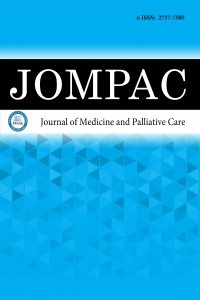1.
Committee on Practice Bulletins—Obstetrics. ACOG PracticeBulletin No. 190: Gestational Diabetes Mellitus. Obstet Gynecol2018; 131: e49-e64.
2.
Telatar B, Kutay NG. Dünyada ve Ülkemizde gestasyonel diyabetepidemiyolojisi. Türkiye Klinikleri Aile Hekimliği - Özel Konular2020; 11: 1-5.
3.
Api O, Boza B. Gestasyonel diyabetin fetal etkileri. TürkiyeKlinikleri Aile Hekimliği - Özel Konular 2020; 11; 66-74.
4.
Yağcan H, Uludağ E, Aypar Akbağ N, Özberk H. Do pregnantwomen’s information sources affect their attitudes toward the oralglucose tolerance test? a descriptive cross-sectional study. AsianWomen 2021; 37: 95-116.
5.
Vitrinel A. Gestasyonel diyabetin neonatal komplikasyonları.Orbay E, editör. Aile Hekimliğinde Gestasyonel DiyabetYönetimi. 1. Baskı. Ankara: Türkiye Klinikleri; 2021: 75- 8.
6.
World Health Organization. Diabetes. https://www.who.int/news-room/fact-sheets/detail/diabetes 10 November 2021,Erişim Tarihi: 16.01.2022.
7.
Gürel Ç, Ozgun MT, Batukan C, Başbuğ M. Prevalence ofgestational diabetes among pregnant women attending ErciyesUniversity Medical Faculty. Erciyes Med J 2009; 31, 323-30.
8.
Özdemir Ö, Sari ME, Ertuğrul FA, Şakar VS, Özcanli G, AtalayC. Ankara Numune Eğitim ve Araştırma Hastanesi KadınHastalıkları ve Doğum Kliniği'ne başvuran gebelerde gestasyoneldiyabet sıklığı. J Clin Obstetr Gynecol 2014; 24: 24-9.
9.
ACOG Practice Bulletin No. 190: Gestational Diabetes Mellitus.Obstetrics and Gynecology 2018; 131, e49-e64.
10.
Türk Jinekoloji ve Obstetri Derneği. (2022). Gebelerde şekeryükleme testi ve önemi. https://www.tjod.org/gebelerde-seker-yukleme-testi-ve-onemi/ Erişim Tarihi: 16.01.2022
11.
ADA. 2. Classification and Diagnosis of Diabetes: Standards ofMedical Care in Diabetes-2018. Diabetes Care 2018; 41: S13-S27.
12.
TEMD Diabetes Mellitus ve Komplikasyonlarının Tanı, Tedavive İzlem Kılavuzu-2020. TEMD Önerileri. https://temd.org.tr/admin/uploads/tbl_kilavuz/20200625154506-2020tbl_kilavuz86bf01 2d90.pdf Erişim Tarihi: 16.01.2022.
13.
Dika Q, Duli M, Burazeri G, Toci D, Brand H, Toci E. Healthliteracy and blood glucose level in transitional Albania. Frontiersin Public Health 2020; 8.
14.
Durusu Tanrıöver M, Yıldırım HH, Demiray Ready FN, ÇakırB, Akalın HE. Turkey health literacy research (1rd ed). 2014;Ankara: Sağlık-Sen Yayınları.
15.
Tugut N, Yesildag Celik B, Yılmaz A. Health literacy and ıtsassociation with health perception in pregnant women. J HealthLiteracy 2021; 6: 9-20.
16.
World Health Organization. Division of health promotion,education and communications health education and healthpromotion unit. Health Promotion Glossary. World HealthOrganization 1998; Geneva -
17.
Abel T. Cultural capital in health promotion. In D. V. McQueen,I. Kickbusch, L. Potvin, J. M. Pelikan, L. Balbo, & T. Abel (Eds.),Health and Modernity: The Role of Theory in Health Promotion2007; 43-73. New York, NY: Springer.
18.
Kiraç R, Öztürk YE. Halkın sağlık okuryazarlık düzeyi ile sağlıkkaygısı arasındaki ilişki. Sosyoloji Araştırmaları Dergisi 2020; 23:214-43.
19.
Furber CM, Garrod D, Maloney E, Lovell K, McGowan L. Aqualitative study of mild to moderate psychological distressduring pregnancy. Int J Nurs Studies 2009; 46: 669-77.
20.
T.C. Sağlık Bakanlığı Türkiye Sağlık Okuryazarlığı ÖlçekleriGüvenilirlik ve Geçerlilik Çalışması. Yayın No: 1025, 2016;Ankara, Mayıs 2016.
21.
Yazıcı E, Pek TM, Yuvacı HU, et al. Perinatal Anxiety ScreeningScale validiy and reliability study in Turkish (PASS-TR validityand reliability). Psychiatr Clin Psychopharmacol 2018;
22.
Immanuel J, Simmons D. Screening and treatment for early-onset gestational diabetes mellitus: a systematic review and meta-analysis. Current Diabetes Reports 2017; 17: 115.
23.
World Health Organization. WHO Recommendations onAntenatal Care for a Positive Pregnancy Experience, Highlightsand Key Messages from the World Health Organization’s 2016Global Recommendations for Routine Antenatal Care 2018;https://apps.who.int/iris/bitstream/handle/10665/259947/WHO-RHR-18.02-eng.pdf Erişim Tarihi: 08.04.2022
24.
ADA. 2. Classification and Diagnosis of Diabetes: Standards ofMedical Care in Diabetes-2020. Diabetes Care 2020; 43: 14-31.
25.
Report of a World Health Organization Consultation. Diagnosticcriteria and classification of hyperglycaemia first detected inpregnancy: a World Health Organization Guideline. Diabetes ResClin Pract 2014; Mar, 103: 41-63.
26.
Liu B, Xu Y, Zhang Y,et al. Early Diagnosis of GestationalDiabetes Mellitus (EDoGDM) study: a protocol for a prospective,longitudinal cohort study. BMJ open 2016; 6, e012315.
27.
International Diabetes Federation. IDF Diabetes Atlas, 10th edn.2021; Brussels, Belgium: Available at: https://www.diabetesatlas.org 15.01.2022
28.
Başbuğ A, Kaya AE, Sönmez CI, Yıldırım E. Gestasyonel diyabettaramasında karşılaşılan önemli bir problem: Gebeler neden oralglukoz tolerans testi yaptırmak istemiyor? Konuralp Tıp Dergisi2018; 10: 144-8.
29.
Dalgıç N, Aşık Z, Ozen M. Gebelerin gestasyonel diyabet taramatestine yaklaşımlarının değerlendirilmesi. J Turk Fam Phy 2020;11: 179-90.
30.
Turan Z, Toker E. Gebelerin oral glukoz tolerans testiyaptırmalarını etkileyen faktörlerin incelenmesi. AdıyamanÜniversitesi Sağlık Bilimleri Derg 2020; 6: 174-81.
31.
Acavut G, Yeşilçinar İ, Uğurlu M, Karaşahin KE. Gebelerin oralglikoz tolerans testine ilişkin farkındalıkları ve medyanın testyaptırma tercihlerine etkisi. Sağlık Akademisyenleri Derg 2021;8: 283-9.
32.
Hocaoglu M, Turgut A, Guzin K, et al. Why some pregnantwomen refuse glucose challenge test? Turkish pregnant women’sperspectives for gestational diabetes mellitus screening. NorthernClinics of Istanbul 2018; 6: 7-12.
33.
Koyucu RG. Gestasyonel diyabet risk faktörleri çerçevesindegebelerin glukoz tolerans testine ilişkin tutumları. Sağlık veToplum 2018; 28: 65-76.
34.
Nacar G, Ünver H, Derya YA, Taşhan ST. Perinatal tarama testleriyaptırmanın gebelik anksiyetesine etkisi. Ann Health Sci Res2018; 7: 35-40.
35.
Tarhan N, Özaydın N. Gebelerin diyabet tarama testleriniyaptırma kararında eğitimin etkinliğinin değerlendirilmesi.Türkiye Cumhuriyeti Marmara Üniversitesi Sağlık BilimleriEnstitüsü. Halk Sağlığı Anabilim Dalı. Yüksek Lisans Tezi 2019;İstanbul.
36.
Sunny SH, Malhotra R, Ang SB, et al. Facilitators and barriers topost-partum diabetes screening among mothers with a history ofgestational diabetes mellitus-a qualitative study from Singapore.Front Endocrinol 2020; 11: 602.
37.
Chen Q, Carbone ET. Functionality, implementation, impact, andthe role of health literacy in mobile phone apps for gestationaldiabetes: scoping review. JMIR Diabetes 2017; 2: e25.
38.
Demircan KD, Çelepkolu T. Sağlık çalışanlarının ve toplumungestasyonel diyabet ile ilgili bilgi ve tutumları. T.C. DicleÜniversitesi Tıp Fakültesi Aile Hekimliği Anabilim Dalı UzmanlıkTezi, 2018, Diyarbakır.

